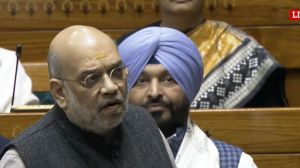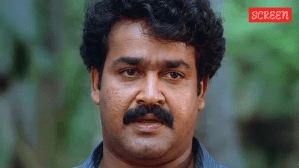Click here to follow Screen Digital on YouTube and stay updated with the latest from the world of cinema.
Patriarch of iconic Bollywood family abandoned his son, forced second family to live in secrecy for decades, went blind in his final days
Filmmaker Nanabhai Bhatt's career began before India gained Independence, but his family and children were destined to remain trapped by his decision for their entire lives.
 Nanabhai Bhatt (C) with Ashok Kumar (R). (Express Archive)
Nanabhai Bhatt (C) with Ashok Kumar (R). (Express Archive)The Hindi film industry has been dominated by only a handful of families for over seven decades. Many of these families can trace their origins back to pre-Independence India, in regions that now fall under Pakistan. Several industry stalwarts, such as Prithviraj Kapoor, Dev Anand, and Dilip Kumar (born Yusuf Khan) moved to Mumbai from Pakistan. But one such family came from Gujarat. Its patriarch was the filmmaker Nanabhai Bhatt, who made 99 films in his career before passing away in 1999, at the age of 83. Over the course of his career, Nanabhai made a name for himself with his low-budget mythological films. He also worked with legends such as Ashok Kumar. But today, he is best known as the father of Mahesh Bhatt. Most of the anecdotes about his life, which was marked by drama, betrayal, abandonment, come from Mahesh himself.
His grandson, filmmaker Mohit Suri, reflected on the family’s legacy in a recent interview with Cyrus Broacha. “My grandfather, Nanabhai Bhatt, made 99 films. He didn’t make 100 because he turned blind.” Nanabhai Bhatt was born in 1915, and was working as a director in the film industry by the early 1940s. His first film was Muqabala, starring the Australian-Indian actor and stunt performer Fearless Nadia. Only a few years later, shortly after Independence, Nanabhai welcomed Mahesh. But the child’s mother wasn’t his wife, Hemlata; it was his mistress, a Shia Muslim woman named Shirin Mohammed Ali. For his entire life, Nanabhai would keep his ‘illegitimate’ family hidden away, refusing to accept Shirin as a ‘wife’.
In an interview with The Times of India, Mahesh looked back on his youth, and coming to terms with the fact that his father didn’t have much of a presence in his life. “I was born after three daughters and followed by a daughter and son. My father did not live with us. When he came home, he never took off his shoes – he wouldn’t be staying. My father had another family: Although my father had two homes, he paid for our education and household expenses. When friends teased me about my father not being at home, I never said he was busy with his film business; rather, I made it clear that he had another home. Despite my pent-up anger, I recognised that there was a bond between my parents which had legitimacy in the heart.”
 Actor Ashok Kumar, Director Nanabhai Bhatt and cameraman Haren Bhatt on the set of film MR X. Express archive photo 13.7.50
Actor Ashok Kumar, Director Nanabhai Bhatt and cameraman Haren Bhatt on the set of film MR X. Express archive photo 13.7.50
Despite being denied the ‘dignity’, as Mahesh put it, that she deserved, Shirin adopted her Nanabhai’s Hindu traditions. She remained a devout Muslim, but behind closed doors. “My mother always wore this big tika, and saree – she liked that kind of thing. But, at the same time, I could see that there was something she was hiding. She felt that her minority status would perhaps interfere with our day-to-day lives. She was a little embarrassed when I flaunted my Muslim roots… when I came to know about it. Yes, she was a little embarrassed about it. She was worried about me during the communal riots in 1992. She was worried when we named my little girls — because my second wife (Soni Razdan) liked those names – Shaheen and Alia. Both are Muslim names. Everybody was worried in 1992,” Mahesh told Rediff.
In an interview with the Hindustan Times, Mahesh said that he never really understood “what a father really is.” He explained. “I never really had one. I have no worthwhile memories of my father, therefore no idea of what a father’s role should be. I am the bastard-child of a single Muslim mother. I remember asking my mother what the meaning of my name was. She said, I’ll ask your father, he’s the one who named you. So, I waited until the next time he came around and said that Mahesh meant ‘Maha-Eesh’ the God of gods. But as a child I didn’t like this angry God who beheaded his own son. I’d have much preferred to be named after Ganesha. I used to sleep with a little Ganesha under my pillow as a child, he was my favourite deity. Just like Ganesha’s father, my father was a stranger to me. He was absent.”
Mahesh reflected on his unconventional childhood in Shivaji Park, and admitted that he never quite fit in. He told BBC Hindi, “My entire family hid this truth, that my father hadn’t declared my mother to be his wife. It was stigma that I lived with. I never quite understood it. On the one hand, we are told to be truthful, and on the other, this truth about my life was being hidden. When I would speak about my background in public, I would get a scolding. These concerns haunted me… It was definitely odd, because I wasn’t invited to others’ houses. And on the rare occasion that I did get an invitation, I would be surprised to see family photos on the walls. ‘Oh, so this is what a family looks like?’ My mother was the epicentre of my universe, she raised us as a single parent.”
 Producer Ram Kamlani and Director Nanabhai Bhatt. Express archive photo
Producer Ram Kamlani and Director Nanabhai Bhatt. Express archive photo
While much of Mahesh’s early cinema was inspired by his own life, his 1998 film Zakhm was a tribute to his mother. It was released only a few months before Nanabhai’s death. In a Lehren Retro report, it was said that the film’s original title was Shirin, but Nanabhai took out an article in the trades opposing it, and denied the existence of any woman by such name. “Of course, this film, like Zakhm, is about my mother. But the main reason why I wrote this film was not her, but my stepmother. For most part of my life I saw my stepmother as a demon, but when I got closer to her I discovered that she was a magnificent woman whose life too was as tragic as my mother’s,” Mahesh told India Today.
Opening up about his relationship with his stepmother, Mahesh said that she, too, lived a tragic life because of the choices Nanabhai had made. But she honoured his wish to be brought to Shirin’s house after his passing. “My stepmother was 94 when my father died, and she said to me, ‘Your father’s body will not come to my home’, which was his legal official residence because he had willed, that post his death, his body should be taken to the house where my mother lived. My mother and my father’s relationship was not a legitimate one in his lifetime. I was awestruck by the magnanimity of this traditional Gujarati woman who was publicly proclaiming that her husband’s choice in death was to be eternally wedded to the other woman who had no legal status in the eyes of the world. That moment of human grandeur of the magnificent heart is something that stayed with me. In my life somewhere when I was growing up, I had looked up to her as a villain, as a vamp, who was a source of my mother’s misery. But only when I grew up and I went closer to that narrative, I discovered that life doesn’t have good people and bad people. Life only has people. Each one cries, dies and dreams. It is your privilege from whose view you will tell the story. At one moment I told the story from the point of view of my mother. And then when I chose to see it from the point of view of my stepmother, the story was equally moving and profound, in fact larger,” Mahesh told Bombay Times.
 Narendra Bansal, Producer RN Mandloi, Nanabhai Bhatt, MS Gite and Director Ramnik Vaidya. Express archive photo
Narendra Bansal, Producer RN Mandloi, Nanabhai Bhatt, MS Gite and Director Ramnik Vaidya. Express archive photo
It was also said that some members of his family secretly scattered Nanabhai’s ashes on Shirin’s grave, a symbolic gesture to unite them in death. Mahesh’s angst towards his father reached a peak after his mother’s death. He told The Lallantop, “I buried my mother. My father loved her, but he never gave her the diginity she deserved in society’s eyes. When she was unwell in hospital, I was worried that she would never see me attain success. She saw the concern on my face, and called me over to her hospital bed. ‘You’re afraid?’ she asked. I said, ‘Yes, you will die’. She said, ‘Relax, the skin on my knees has peeled off because of all the prayers, my God will not let me down. I’m not going anywhere before you’re successful’. She didn’t die. She told me, ‘You’ve given me strength. Let him not consider me his wife, but nobody can deny that you are my son’.”
Nanabhai attended her funeral with Hemlata, and made a gesture of devotion that angered Mahesh further. He told Arbaaz Khan on his talk show, “I remember that when she died, and my father came with his wife, that’s the time he put sindoor in her maang and I said ‘too little too late’. That broke me down. She always wanted a picture of him publicly accepting her.”
 Film Director Nanabhai Bhatt with Nazir Kashmiri.
Film Director Nanabhai Bhatt with Nazir Kashmiri.
However, Mahesh’s nephew, director Dharmesh Darshan, said that Nanabhai didn’t abandon either of his ‘wives’, and that they all lived together like a big, happy family. He told Lehren Retro, “It’s rubbish… there’s very little truth to it. Every truth can be distorted. Mahesh mama is my saga mama (real uncle), and my mother was obsessed with him. In 1939, my grandmother and my grandfather got married. The Hindu Marriage Act came in 1959, and by then my mother also was married. I didn’t even know my grandmother’s name was Shirin until Mahesh mama said it was an issue. I had an extraordinary other grandmother. They were both legitimate, because I saw both of them… My grandmother had six children and the other grandmother had three children,” he said, adding that his grandmother, Shirin, lived in accordance with Gujarati-Hindu traditions. “I used to call her ‘mumma’, not ‘amma’,” he said, and called his grandfather a ‘great man’ who was ‘flogged’ in public for no reason.”
During his career, Nanabhai Bhatt worked both in Hindi and Gujarati cinema. His biggest hit was 1959’s Kangan, starring Nirupa Roy and Ashok Kumar. Muqabala was one of the first films to utilise double-roles as a device. Some of his other well-received films were Alibaba Aur Chalis Chor (1954), Zimbo (1958), and Lal Qila (1960).
- 01
- 02
- 03
- 04
- 05


































